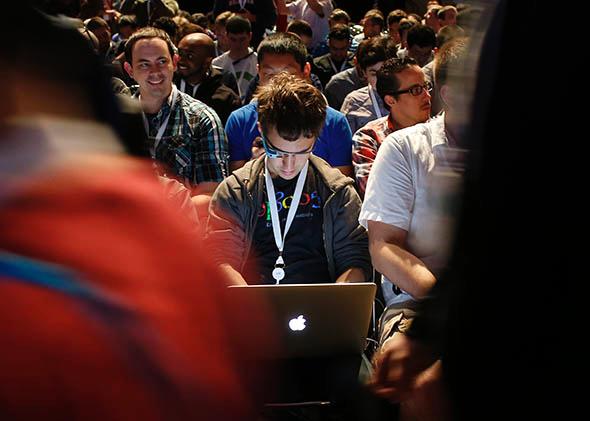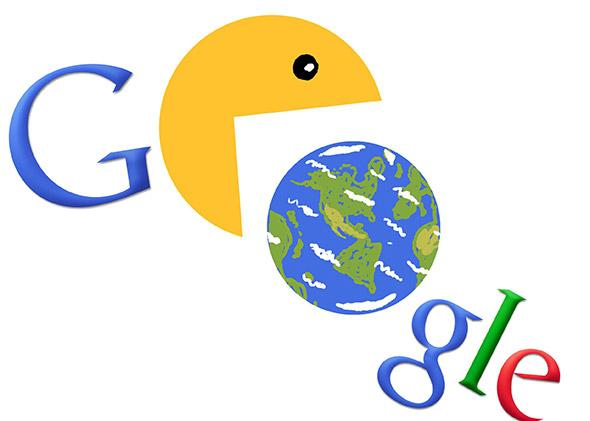Compared with, say, Apple, Google does not do flash very well. I can’t think of a time when a Google product or announcement created a collective press orgasm in the way the iMac or the iPod or the iPhone or the iPad did. But Google isn’t really even trying at its I/O conference; it’s instead ginning up business and development interest in its platforms. Those platforms include Android, Chrome, YouTube, Maps, dive-bombing balloons, your clothes, your air conditioner, and your data. Below is my best estimation of Google’s master plan to become the connective tissue of the Internet, of all data sharing, and eventually of life itself. (Disclosure: I used to work at Google and my wife still does, but I was never shown any master plans.)
Objective No. 1: Google+ is dead. Long live Google+.
Google+ was the failed face of Google’s shift from Web search to data (consumer data especially), but the shift lives on, less visibly. A few years ago, when Google+ launched, it made sense to more or less copy Facebook: Facebook’s lousy user interface, endlessly eroding privacy policies, and inept data management (you still can’t search through your old posts) should have given Google an opening to build a better social network. Instead, Google blew it big-time by abandoning user outreach and making a number of hamfisted moves to convert Gmail and YouTube users into Google+ users. While this got Google+ big user numbers (at least until CEO Larry Page “stepped in and made a distinction”), it did nothing to get people actually using Google+. The product grew to be loathed by Google users and Google engineers—but more often ignored. Google+ VP Vic Gundotra was shown the door for ineptly copying more successful competitors, or for “pulling a Ballmer,” as we call it in the biz.
But the demise of Google+ just means the part of Google that mimicked Facebook is gone. Persistent logins across Google properties and aggregation of user data are still full steam ahead. Today Google is effectively a cross-device platform. On Android, you’re logged in to Google all the time, while Chrome effectively acts as a de facto platform for PCs; Gmail, Maps, and YouTube are three platforms within those platforms. You don’t have to see the Google logo or a Google website for Google to be acting as an intermediary (or, if you’re using Chrome on Android for YouTube, several intermediaries). After Google bought thermostat-maker Nest, John Battelle asked VP Sundar Pichai, “Will we have to join Google+ to turn off our thermostat?” You can practically hear Pichai spitting out his coffee as he responds, “Definitely not!” You don’t have to join Google+ … you just have to join Google.
Google has learned from Google+. When the next Facebook comes around, Google won’t copy it after the fact. Instead, Google wants to own a piece of it.
Objective No. 2: Become the middleman for data.
Google’s advertising goldmine will not endure on Web search alone. Google made its money by being an advertising platform—by being the indispensable middleman between companies and consumers. Being a platform is far more lucrative and far safer than dabbling in a single application at a time: Facebook makes money off being a social platform, Amazon makes money off being a commerce-and-shipping platform, and Microsoft (still) makes money off being an operating system platform. If you’re the one-stop platform for something—as Microsoft used to be and Amazon is now—you can treat your vendors the way Amazon treats publishers: “the way a cheetah would pursue a sickly gazelle,” in Jeff Bezos’ immortal phrasing. Go, cheetahs! Kill those gazelles!
After Web search, Google is betting that the next revolution will have something to do with user data. So it’s now trying to be a data platform, creating application programming interfaces, or APIs, for other companies to write applications on top of. The newly announced Gmail API is one piece of that platform. By letting third-party apps do their work on your Gmail, Google reaps the benefits of any awesome email-processing innovations a small app developer happens to dream up—without having to take the risk of developing the apps. The Wall Street Journal gave some examples: “A travel app, for example, could scan your email inbox for booking confirmations and automatically compile them into an itinerary. An expense app can dig through your inbox for receipts and automatically file them to your cloud-based account.” But just as Google and Apple have control over their respective app stores, Google would have big pull over Gmail applications. Similar APIs could be made available for any other content that went through Google properties, assuming Google could get the rights worked out.
Consumer data is always the simplest to commodify, though, because unlike Hollywood and record labels and book publishers, consumers don’t have lawyers. As smart watches and smart fitness monitors become tinier and more ubiquitous, as cars get smarter and civic infrastructure gets smarter and your thermostat knows which room you’re in and your clothes know what time you go to sleep and your fridge knows what you ate last night and your toilet knows you’re pregnant, there’s going to be a lot more data, much of it automatically collected, collated, and aggregated. “Wearables” are one part of that: wearable computers that blend in with your daily life more smoothly than a phone or a tablet (or Google Glass, for that matter). “Sensors can be small and powerful, and gather a lot of information that can be useful for users,” Pichai said at SXSW. That information is also useful to companies that want to sell you things. And if Google stands between your data and the sellers and controls the pipe, then life is sweet for Google. It’s good to be king—and by “king” I mean “exclusive middleman.”
Objective No. 3: Become the Windows of stuff.
Microsoft was king when the PC was king. Google does not want to be left holding the bag when Web search is no longer what it was. What Microsoft failed to do was A) extend its Windows platform beyond the desktop, and B) convince people and other companies to make Microsoft a middleman for online activity and commerce. (Microsoft Passport and HailStorm were two failed attempts to do this.) Microsoft didn’t succeed because Microsoft did not have any control over that brand-new platform of the Web.
Back then, the Internet was the Wild West, and so new companies built their own platforms there. Once a new space is colonized by platforms, it is far more difficult to create a behemoth like Facebook or Amazon. If Facebook started off as an Android app rather than as a website in the free wilderness of the desktop Internet, having to use Google’s advertising platform instead of building its own, do you think Facebook would have become the lucrative monster platform it is today? No, I don’t think so either. Google—and Apple, and Facebook—wants to make sure that doesn’t happen again.

Photo by Stephen Lam/Getty Images
So by building out software infrastructure, hardware infrastructure, and network infrastructure, Google’s doing what Microsoft didn’t do when it had huge cash reserves in the late ’90s and early 2000s. As long as the desktop and Windows were central to computers, Microsoft profited. Having realized long ago that Web search will not be around forever, Google is trying to pull Microsoft’s trick of being the platform everyone uses, while Apple remains a boutique provider. Google is going about it on three levels.
First, the existing Web and software platforms. Android, Chrome, Gmail, YouTube, and DoubleClick—these you know. The operating systems (e.g., Android) are most important because they have the potential to be to everything what Windows was to PCs.
Second, the hardware platforms. Google Glass isn’t up to much at I/O, the Chromebook remains rather underwhelming, and Google’s tablet offerings are nice but hardly revolutionary. But Google is now making a much stronger push into hardware, tightening the Android hardware story with Android Silver, developing smart watches, doing something with those intelligent thermostats from Nest, and probably lots of other secret things. Google doesn’t need to build every device you own. It just needs to get Android on enough of those devices—all communicating with one another and all linked to your Google account—so that the network effect induces other hardware companies to build their smart hardware on top of Google platforms. Arguably, it doesn’t matter if Google Glass itself fails as a product, as long as other companies start building Glass-like devices—with Android.
Finally, network platforms. Ars Technica has written about Google’s new Access and Energy division, which in addition to the Google Fiber networks includes energy initiatives and those pesky crashing Internet balloons. None of these other platforms are good for anything if people don’t have the network infrastructure to get to them, and since telecoms are dinosaurs and the U.S. government won’t even improve highways, much less Internet infrastructure, Google isn’t keen on waiting around. Which brings us to an important postscript.
P.S.: Crush telecoms.
Nothing annoys platform companies like having to go through other platforms. If you think you’re mad at telecoms and cable companies, that hate is a mere fraction of what Google execs feel toward them. Between Netflix paying off Comcast and Verizon to get a faster video network pipe, broadband providers’ archaic infrastructure and poor customer service, and dealing with near-weekly idiocies like Verizon’s Chromebook data plan screw-up, you can be sure that Google sees Verizon, Comcast, and the rest as gazelles in desperate need of euthanasia. Google would love to go all Hachette on Time Warner’s butt, and Google’s huge move into fiber networks, satellites, wind turbines, and balloons is intended to contribute to the gazelle-ification of a bunch of telecoms no one likes. You can’t build a platform on top of ancient deadwood. Having built one platform beachhead in advertising and planning out several more platforms in new markets, there is one bit of cleanup that remains for the master plan to be complete: Grind the old platforms—the ones leeching off your success—into dust.
